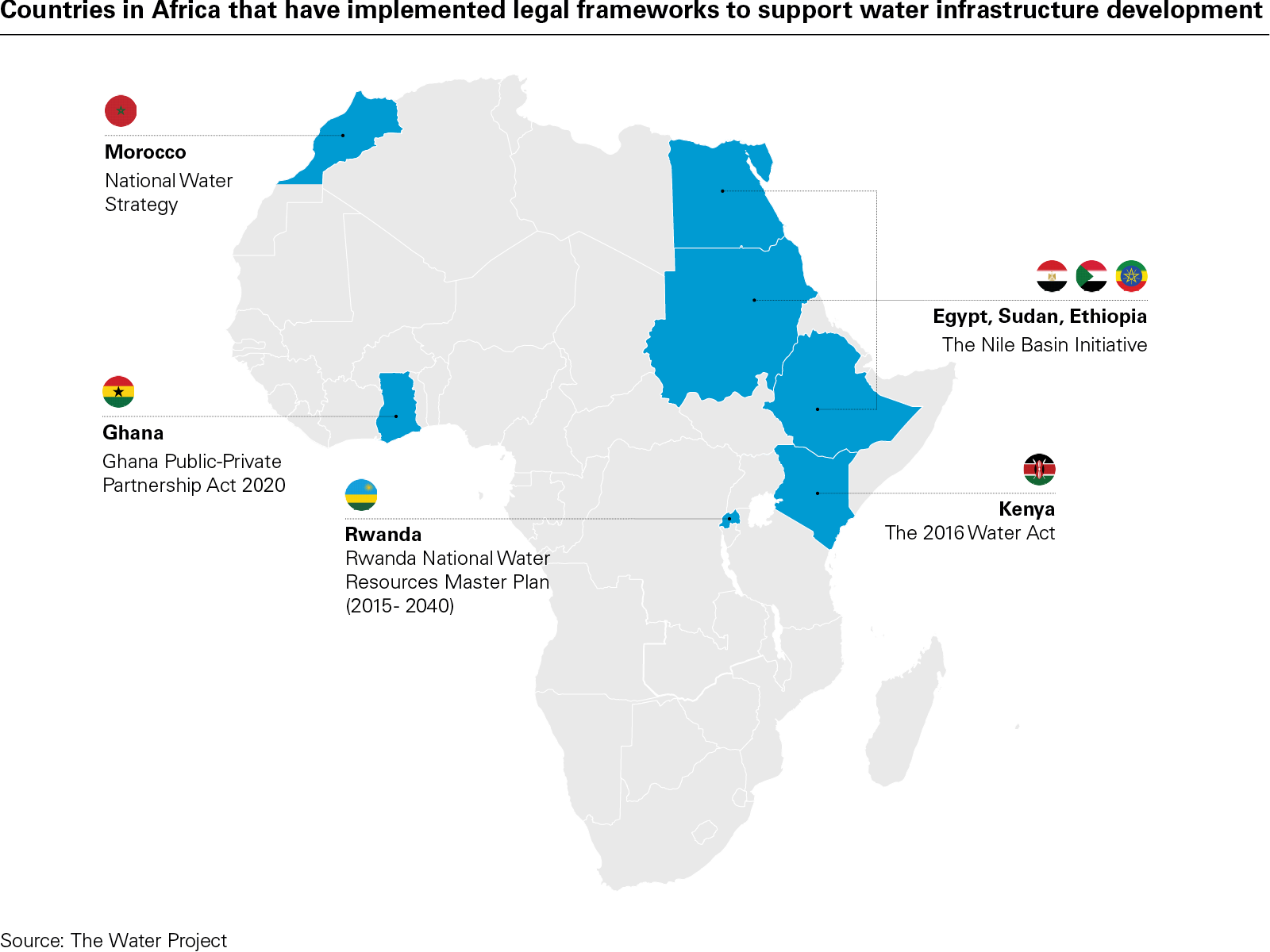Food security remains a critical issue in Africa. The ongoing water infrastructure crisis—marked by insufficient investment, water scarcity and the impacts of climate change—is the key factor undermining the continent's ability to sustainably feed its rapidly growing population. Resolving these problems requires increased financial investment, infrastructure development and robust legal frameworks that promote effective water management, including enhancing water governance, ensuring equitable distribution of resources, and creating financial mechanisms that attract both public and private sector investment.
This article explores the underlying causes of the water crisis, its consequences for food security, and the potential legal and financial strategies necessary to mitigate these pressing issues.
Key food security challenges
Africa has long suffered from underinvestment in water infrastructure, with many nations struggling to maintain even basic systems for water supply and irrigation, particularly in rural areas where the majority of agricultural activity takes place. This lack of a solid infrastructure hampers the ability to effectively store, manage and distribute water, especially during periods of drought or erratic rainfall.
Regions particularly affected include:
- The Horn of Africa (e.g., Ethiopia, Somalia): Facing recurring droughts exacerbated by climate change, water shortages in Ethiopia have severely impacted agriculture and drinking water. Ethiopia has adopted reforms, including the Water Resources Management Policy, to improve water governance and conservation practices.
- The Sahel region (e.g., Chad, Mali, Niger): Erratic rainfall, desertification and shrinking water sources like Lake Chad have made the region especially vulnerable. In response, Niger has implemented the Sustainable Development and Climate Change Adaptation Plan, integrating legal reforms to regulate water use.
- Northern Africa (e.g., Egypt, Tunisia): Relying on rivers such as the Nile, countries such as Egypt face growing challenges related to water allocation due to the upstream usage by other nations. Egypt has recently reformed its Water Resources and Irrigation Law to focus on efficient water use and combating illegal water extraction.
- Southern Africa (e.g., South Africa): Recurrent droughts and crises such as the "Day Zero" incident in Cape Town highlight the need for stronger governance. South Africa's National Water Act and Water Pricing Strategy seek to address these challenges through sustainable water use and pricing reforms.
Resolving the water crisis through legal frameworks
Legal systems play an essential role in shaping water management practices, guiding investment in infrastructure and ensuring equitable access to resources. However, many existing legal frameworks across the African nations are fragmented, outdated or ill-suited to address the complexities of water management given the evolving climate conditions and socio-economic factors. Thus, a reform-focused approach to water resource management is crucial.
Water rights and allocation policies
The key to food security is ensuring equitable access to water. Legal reforms should focus on clarifying water rights, particularly in regions where water resources are shared across communities or nations. For example, in Kenya, the 2016 Water Act was introduced to streamline water management and enhance equitable resource allocation.
Integrated Water Resource Management
The Integrated Water Resource Management (IWRM) principles are vital for coordinating water, land and related resources. By incorporating IWRM into national legislation, countries can balance agricultural, industrial and household needs while safeguarding the environment. Rwanda's National Water Resources Master Plan (2015 – 2040) is an example of IWRM legislation that integrates environmental conservation with socio-economic considerations.
Transboundary water
Given the number of rivers and lakes that cross national borders in Africa, effective legal agreements are essential for governing shared resources. The Nile Basin Initiative, for instance, is a cooperative legal framework that promotes equitable water sharing and conflict prevention among the Nile River Basin countries, including Egypt, Sudan and Ethiopia.
Water infrastructure financing solutions
One of the primary barriers to addressing Africa's water crisis is inadequate financing. Water infrastructure projects are capital-intensive and require a long-term outlook. Therefore, collaboration between governments, the private sector and international bodies is critical.
Public-private partnerships (PPPs)
Public-private partnerships (PPPs) can facilitate investment in water infrastructure. However, their success hinges on clear legal frameworks that define risk-sharing, revenue models and regulatory oversight. Ghana's Public-Private Partnership Act 2020 is an example of legislation designed to foster collaboration between the public and private sectors in water and infrastructure projects.
Blended finance mechanisms
Blended finance combines public funds, donor assistance and private capital to reduce investment risk in water infrastructure. The African Development Bank (AfDB) has deployed blended finance mechanisms through its Africa Water Facility, which offers technical assistance and project preparation to attract private investment.
Water pricing and tariff structures
Establishing fair and sustainable water pricing mechanisms is essential to fund infrastructure while ensuring access for vulnerable populations. Countries such as Morocco have implemented tariff structures under their National Water Strategy, which reflects the cost of water while safeguarding low-income users.
International climate and development funds
African nations can also tap into international finance mechanisms such as the Green Climate Fund (GCF) to support water infrastructure projects that enhance resilience to climate change. However, accessing these funds requires compliance with stringent environmental and social safeguards.
Policy recommendations
Some policy recommendations to address the water infrastructure crisis and enhance food security include:
- Water governance laws: Governments should update and strengthen water governance laws to facilitate integrated resource management, clarify water rights and encourage private investment.
- Tax benefits: Legal frameworks should be designed to provide tax benefits or risk guarantees that attract private sector investment in water infrastructure.
- Regional contractual cooperation: Transboundary water management requires robust legal agreements that facilitate collaboration among neighboring countries. The Southern African Development Community has developed a Protocol on Shared Watercourses to promote cooperation.
Africa's food security is deeply intertwined with its water infrastructure. The current crisis, driven by underinvestment, scarcity and climate change, poses significant risks to agricultural sustainability. Legal and financial solutions, including stronger water rights, integrated water resource management laws and financing mechanisms are crucial to addressing these challenges.
Thus, by reforming legal frameworks, enhancing investment models and fostering regional cooperation, Africa can build a resilient water infrastructure that supports sustainable food production and secures the continent's future.
White & Case means the international legal practice comprising White & Case LLP, a New York State registered limited liability partnership, White & Case LLP, a limited liability partnership incorporated under English law and all other affiliated partnerships, companies and entities.
This article is prepared for the general information of interested persons. It is not, and does not attempt to be, comprehensive in nature. Due to the general nature of its content, it should not be regarded as legal advice.
© 2025 White & Case LLP
![Aerial View of Palm Oil Plantation [Ghana]](/sites/default/files/styles/magazine_publication_image/public/images/hero/2025/10/africa-focus-autum-2025-thought-leadership-the-european-deforestation-directive-implications-for-africas-food-security-hero.jpg?itok=YUCckZ-2)
![Wall dividing a agriculture field from above [Angola]](/sites/default/files/styles/magazine_publication_image/public/images/hero/2025/10/africa-focus-autum-2025-thought-leadership-securing-africas-future-building-resilient-food-and-energy-systems-hero.jpg?itok=rPIUhjaQ)

![Victoria Falls [Zambia]](/sites/default/files/styles/magazine_publication_image/public/images/hero/2025/10/africa-focus-autum-2025-thought-leadership-food-security-in-africa-tackling-the-water-infrastructure-crisis-through-legal-and-financial-strategies-hero.jpg?itok=nIo8RzZW)



![Victoria Falls [Zambia]](/sites/default/files/styles/original_image/public/images/hero/2025/10/africa-focus-autum-2025-thought-leadership-food-security-in-africa-tackling-the-water-infrastructure-crisis-through-legal-and-financial-strategies-hero.jpg?itok=IKyyCgA8)
 View full image: Countries in Africa that have implemented legal frameworks to support water infrastructure development
View full image: Countries in Africa that have implemented legal frameworks to support water infrastructure development
